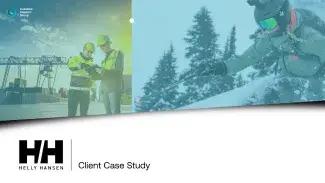About Helly Hansen
As their logistics manager for Europe, Artur is responsible for inbound and outbound logistics at Helly Hansen.
“Helly Hansen has been around since 1877 and is one of the top five players worldwide when it comes to outdoor gear and workwear. Recently, there have been periods where we grew by 30% annually” he explains.
“We import a lot from countries like Vietnam, Cambodia, and China, but also from Turkey and occasionally from the United States. In addition to Oslo, we have our second headquarters in Sumner, Washington, on the west coast.”
Sven, Helly Hansen’s inbound planner, adds “You have to imagine that between 100,000 and 300,000 goods leave our DC [distribution centre] in Born weekly, for all of Europe and even beyond” – illustrating the volume of goods which pass through this location.
The challenge
Helly Hansen has two main container streams: shoes and clothing. Rob outlines how the risk profile for a container of shoes is high:
“Imagine walking into a shoe store. You smell all sorts of things, and that’s not always good for your health. That smell comes, for example, from the glue used to attach the soles to the shoes, which contains solvents like toluene and benzene. You can imagine that when these gases are trapped in a container for six weeks, with the sun beating down on it, they start to accumulate. Before these shoe containers can be safely unloaded, they need to be ventilated. We do that for Helly Hansen, and for many other clients across the Netherlands.”
Helly Hansen imports approximately 200 shoe containers to their DC in Born annually. For other products, the amount is often much higher. Artur explains why it’s important to have a partner like Customs Support Group locally:
“We ship almost all containers by sea; maybe 1% goes by truck. So, it’s very convenient that Customs Support Safety has its own ventilation area at the transshipment terminal in Born. The communication also runs smoothly.”
With such a high volume of containers and continued growth, the challenge is to keep the operation efficient and safe.
The solution
Communication is essential in this process – both with the terminal so CSG knows when containers arrive, and with Helly Hansen so the packing information is known before arrival.
Rob explains “We need to know what products are in the containers so that we can adjust our measurement process. For Helly Hansen, we measure based on a risk analysis, where if certain conditions are met, not every container needs to be measured for gas. This allows us to plan our specialists’ time for Helly Hansen carefully.”
Artur comments on how CSG’s people and solutions make the difference:
“Customs Support Safety is a professional organisation; that’s clear. I’ve experienced this in previous positions at other companies, and it’s great that we can work together again. The people are professional, and the IT systems are well integrated. We easily incorporate Customs Support Safety’s systems into our own ERP system.”
The result
“It’s a great triangular relationship”, says Rob. “We measure the containers as soon as they arrive at the terminal. If there’s too much gas inside, we ensure that the containers are clean by the next day, so they can be safely unloaded by the dock staff without delay.”
Sven adds: “If there’s a delay at sea, we contact Customs Support Safety directly. They are flexible enough to adjust the schedule quickly. We’re basically in daily contact, though most of it is digital. And it’s great to work with good people; that’s perhaps the most important thing.”
Rob adds to Sven’s remarks:
“Helly Hansen wants one thing: for the container to be received at the agreed time, whether it was initially rejected or not. It’s our job to make sure that happens. And we do.”
“For us”, Rob concludes, “the most important thing is that Helly Hansen can trust that all their containers can be safely unloaded, and that customs can confidently carry out all necessary inspections.”
Want to streamline your border processes for gaseous goods? Discover how Customs Support Safety ensures safe an efficient handling of your shipments, here.















